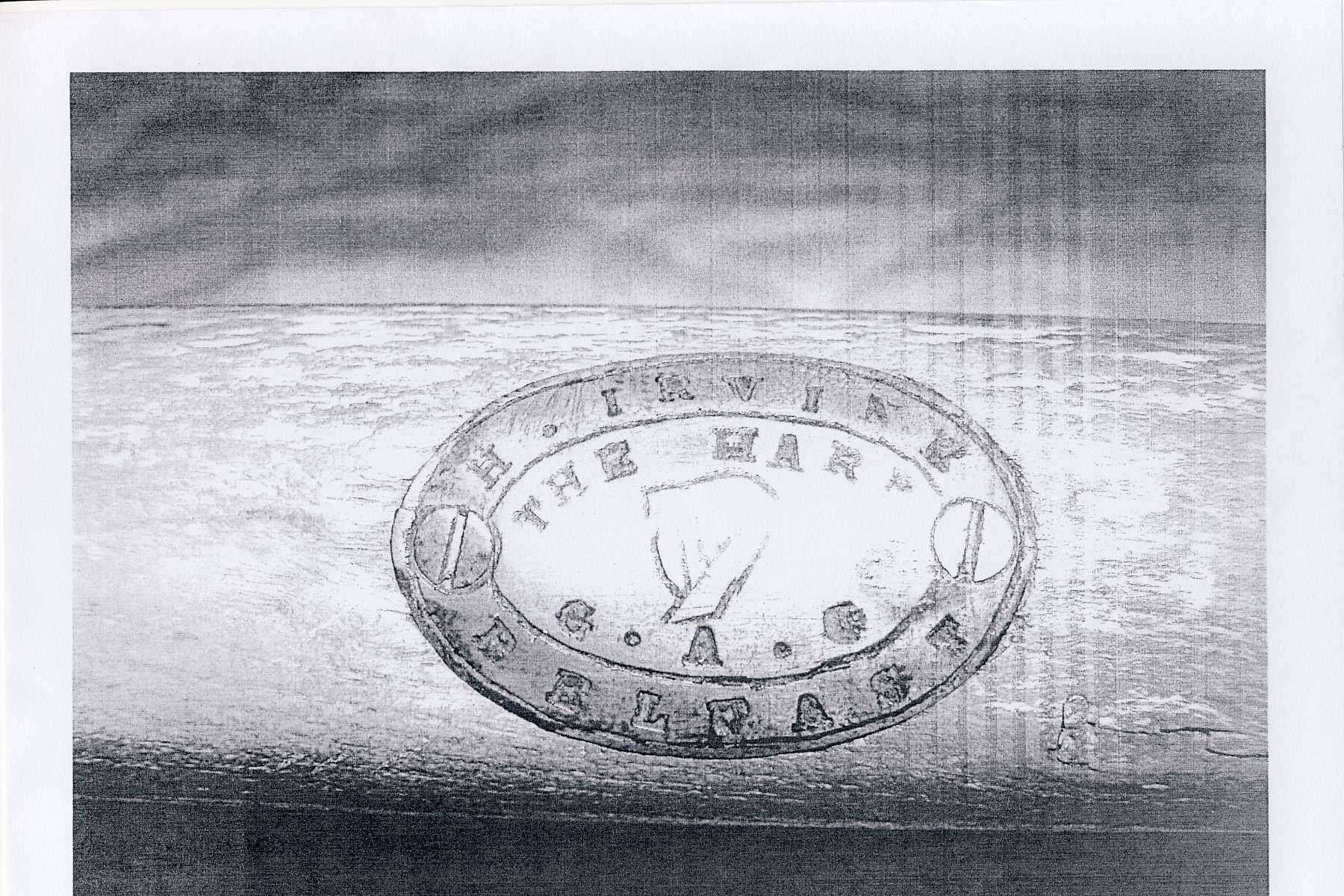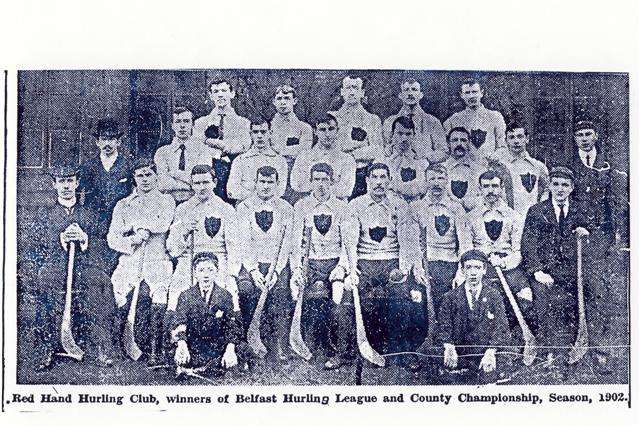"A journey of a thousand miles starts with one small step". Period 1885
-1921, The Early days:
The Belfast Gaels, hurling.
1885-1891:The first established club in Antrim was The Belfast Gaels or the
Pioneers as they were known and were situated in Stephen’s St. Those premises in
the long interim, became more widely known as the John Mandeville Club.
Prominent early founding
members: The Rev; J O’ Reilly,Loughguille. CC St Mary’s Chapel. Messrs:
P.Burns, P. Cunningham, A.Hegarty, T.Loughran, J.HegartyT.Heaney. M.Brady, &
J.Downey.
Honours: None listed. (Antrim
had no recorded history at this time).
Belfast Harps, hurling. 1885-1891
Prominent members: Brothers
Harry & Jimmy, Laverty.Pat Mc Cavana,( Antrim Saw Mills). M.Mullholland, J.
Brady, John Mullholland,( News agent & hardware merchant Falls Rd.). L.
Hatton, Hannastown. P.Mc Coy,T.Maghery, Hugh Boyle Brady, acted as secretary.
The matches were played on Donnelly’s field, adjacent to Stephen’s Street and
Union Street. Honours: None listed
This is the only known photographic link to the Belfast
Harps. The engraving on the shaft of the hurling stick reads "The Harp GAC” and
carries the name H Irvine, possibly a players name or the maker ( From G
McIlhatton archive)
Lisburn Red Hands: hurling. (
no recorded history).
William Orr’s:
hurling. (no recorded history).
Divis
Rangers: hurling. (no recorded history).
We believe these are the five clubs listed in
Thurles.
Other than a mention in the F.J. Mc Carragher Booklet, there
is little known history of these clubs. But it is recorded in the Central
Council Executive Headquarters. Thurles, Co Tipperary for the year 1885, the sum
of, £3, ( three pounds) as affiliation fees for the 5 Belfast
clubs.
In 1891 county championships were played and in the final, Cavan
Slashers beat Northern Stars Belfast. (From T.P O Sullivan, story of the GAA.
1916 page 94).
Northern Stars. Belfast :
(football). Apart from this there is no other mention of this team.
The year 1891 saw the Parnell Split, (see Irish History for
the period), and was a disaster for the GAA through-out Ireland. After the
O’Shea divorce case, the Central Council issued a statement intimating its "
continued adherence to Parnell principles and leadership” two thousand members
walked at his funeral with camens draped in black. The clergy had denounced
Parnell and after this relations with the GAA worsened.
The Parnell Split divided the GAA into hostile camps, for, or
against Parnell. The political tensions, attendant bitterness, and confusion
proved deadly. The five Belfast Antrim hurling clubs split, faded into the limbo
of things forgotten and out of existence.
The Revival Begins - In
October of 1889 efforts were made to reorganise the GAA in Antrim.
Red Branch Gac. 1898. Coming
into existence at a meeting in the lecture hall of the Hibernian Club, Belfast.
Elected to office. Messrs: J.Mallon (President), L.Cahill (Vice President),
T.O’Rawe (Treasurer), & P.J. Cunningham (Secretary).
Clubs identified with the revival in Belfast were, Belfast
Gaels, (reorganised), Brian Og’s, Peter O Neill Crowleys, Red Hand, John
Mitchells, Tir-na-nog, St Vincents, Dalcassians, Seaghain-an-Diomais, Ben
Madigans & Teelings of Lisburn.
Junior clubs: Rapperee’s,
Michael Dwyer’s, Mulchay’s & Emmet-og Clonard.By early 1900 old wounds were
beginning to heal, and the revival in Belfast-Antrim had become a reality.
Competitions in those early days, consisted mainly of
challenge games. Teams were 21 a side, the hurling ball was call a "Nag or Nig”
and was sometimes a solid gutty or knot of wood. The veune’s were a field of
the Glen Rd, part of which later became the site of Airfield House, the family
home of T. R. Mc Caffrey and the son’s, Mountain Brewery.Also used was the old
distillery ground, Broadway. In 1889, Belfast Harp’s visited Cookstown 3 times,
Monaghan Town, Ballybay and Derry City. Their stay in the Maiden city occupied
2 days, Easter Sunday and Easter Monday, no small feit in those far off days.
The GAA revival was confined mainly to West Belfast and in fact mainly to the
Falls Rd area. Clubs were being formed in every district.
Brian Og - 1889 Hurling
Brian Og had the honour of being the first Co. Antrim senior
hurling champions. They defeated the Belfast Gaels, in the late summer of 1901
at the Falls Park. On 12th May 1902 they became Ulster hurling champions by
beating Tir-na-nog in the final. Dick McDaniels was the referee. James Langtry
was captain of Brian Og & Paddy Kelly captain of Tir-na-nog. The only
report of the match was carried in the Belfast Morning News, later to be known
as the Irish News. Dempsey, McVeigh and King were best for Tir-Na-Nog, Kennedy
Collins and Langtry for Brian Og.
Brian-Og were again crowned champions in 1909. They were
managed by Sean Corrigan, in whose honour Corrigan Park was later
named.Prominent early members Messrs: B O’Brien, D O’Brien, J Mackle, H Mackle,
T Rogan, F Collins, T Collins, J Collins senior, J McGowan, J Hogan, J McFadden,
P Harbinson, P. Donnelly. M Kelly, Peter Donnelly, J McShane, T McKenna, J
Jennings, F Kelly, J Harbinson, F Cahill, J Fahy, P Kelly, J Collins junior, J
Corrigan, J Rogan, G. Cahill, H Downey, J McKeown, P McFadden, M Hamill, T
McShane, P Hughes, Harry Vernon and J McKenna.
HONOURS: Antrim senior
Hurling champions 1901 & 1909.Ulster Hurling champions 1902.
Red Hand 1900-1910-Hurling
Red Hand hurling Club:
1900-1910.The Red Hand hurling club was reformed from the Red Branch in Milford
St school around 1900, they were also known as the Belfast Lamhdhearg. It was
under this title that they are recorded as County Champions in 1902.
Prominent early members
Messrs: H.Laverty, (later to Crowleys). Jimmy Laverty, J.Mc Kay, J.Mc
Ferran, (later to Shauns), P.Mulligan, B.Delargy, P.Orr, J.Langtry, N.Mc
Farland, F.Lowe, J.Bateson, Jimmy Culbert,(later to Crowleys). M.Kelly,
H.Gallagher, James Mc Donnell, John Mc Donnell, J.Brady, C.Mc Comb, F.Mc Cotter,
H.King, B.Skeffington, J.Mc Connell, & Tom Creaney.
In 1902 they became county champions, beating Crowleys in the
final at St Malachy’s College ground, Antrim Rd.There is little history of this
team, they faded around 1910.
Honours: Senior hurling
champions 1902, Belfast Hurling League winners 1902.
Young Owen Roe: This was a
Junior Club of the Red Hand, apart from a mention in the "Hugh Lawell” notes
there is no known history of this team.In 1901 this was the draw for the first
officially organised competition by the GAA in Antrim.Brian og v Young
Pioneers.Tir no nog v Old Pioneers. (Belfast Gaels) Crowleys v bye.
Peter O’Neill Crowley’s- 1902-1907 Hurling and Football
The Crowley’s were formed in the Clonard district, the clubs
headquarters, were Aboo Street.( now Kane St). Huge crowds gathered Sunday after
Sunday, to watch games between various clubs. There standard of Hurling was
exceptionally high. The club ground was Kilclooney Park, Beechmount Ave, where
J.B. Kennedy’s Bakery once stood.
Prominent early members:
Messrs Hugh O’Toole, J Hughes, P McCabe, P Robinson, D Jervis, J Durkin, J
McVeigh, T Creaney, J Cunningham, J McMahon, E McGoran, Ned McMahon, Bernard
Donnelly, P Dealott, J McCann, P Clarke, P O’Hagan,* Edward Trodden, J
McDonnell, J McCallum.In 1907 Crowley’s disbanded as a mark of respect upon the
death of their captain Hugh O’Toole.* Edward (Ned) Trodden was shot and killed
in a barber’s shop on the Falls Road, by a murder gang of the RIC. Edward was a
prominent republican during the war of Independence and is buried in Milltown
Cemetery, his grave is under the care of the "National Graves Association”.
A Celtic cross in Hannastown Cemetery is a reminder of the
first Crowley’s team. Around 1910 Crowley’s re-grouped, the club headquarters
were now in Dunville St, later to become home to Michael Davitt’s. The men
responsible for re-organising Crowley’s were well known brothers, James, John
& Ned McMahon.
Also named were Messrs: N.
Dougan, Dan O’Toole (possibly a relative of Hugh O’Toole), F Rush, "Bruiser
Burns” , "Bull McCormick”, D McAleese, C McGlinchey, T Burns, P O’Neill, G
Stanley, J Eccles, T Garrigan, J Craig, WM Robinson, F McArdle, J MC Groarty,
Pat "Scalper” Callaghan, J Oneill, WM Mc Glinchey, T McCartan, S Mc Millen, T
Cunningham, P McGowan, P Slane, Hugh O’Neill, J O’Neill, F Mitchell, F
McCrystal, J McQuillian, T Ferris, D Ferris & FJ Mc Carragher. (acted as
club secretary) He later became secretary of St Galls GAC.In His honour a
perpetual shield was named after him and is competed for in the South Antrim
Division each year.
In the 1990’s Crowley’s were once again re-organised and for a
number of years fielded teams at both football and hurling in the South Antrim
leagues. However this could not be sustained, and they once again slipped into
things forgotten.
HONOURS: Senior Hurling
champions 1903 & 1907, Senior Football champions 1905.
Peter O’Neill Crowley- " The man himself”
Peter O’Neill Crowley was a native of east Cork and the leader
of an IRB unit in Ballymacoda, Co Cork. This 100 strong unit attacked Knockadoon
coastguard station, seeking to secure arms on the night of the rising, 5th March
1867. With the imminent failure of the rising because of informer betrayal and
unseasonable heavy snow and cold weather, Crowley, Capt. John McClure and Edward
Kelly along with others, decided to march for Limerick.
They hoped, through strength of numbers, to be able to resist
English counter measures against their fight for Irish freedom. However, while
passing through the Kilclooney area at the end of March 1867, they were attacked
by crown forces under the command of Henry Edward Redmond R.M. (uncle of John
Redmond, who was prominent in history of later times).
Peter O’Neill Crowley fought bravely, but was mortally wounded
while trying to cross a strong stream in Kilclooney wood. His funeral from
Mitchells town to Ballymacoda was one of the most impress demonstrations ever,
of the Irish people’s affection for their beloved Fenian hero’s. There is a
statue in Cork City, and a monument in Kilclooney wood, in honour of Peter
O’Neill Crowley. Crowley’s ground in Beechmount Ave Belfast was named Kilclooney
Park.
Peter O’Neill Crowley was commemorated on Sunday 2nd April
2000 in Kilclooney wood. Over 1,000 people attended the commemoration. The
guest speaker was noted historian and leader of the Wolfe Tones Ballad group-
Derek Warfield.


